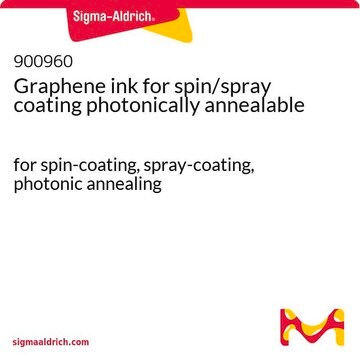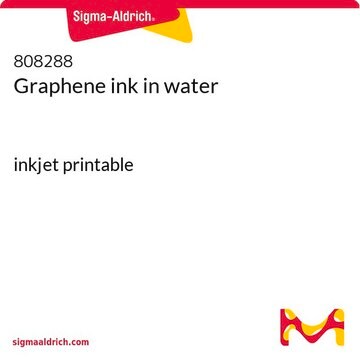900442
Graphene/PEDOT:PSS hybrid ink
dispersion in DMF, avg. no. of layers, 1 ‑ 3
Synonym(s):
Conductive ink, Electrochemically exfoliated graphene ink, G/PEDOT:PSS, Graphene ink
About This Item
Recommended Products
Quality Level
form
dispersion (in DMF)
feature
avg. no. of layers 1 ‑ 3
concentration
0.2 mg/mL (PEDOT:PSS)
1 mg/mL (electrochemically exfoliated graphene)
sheet resistance
500 Ω/sq, 20 nm film: 80% transmittance
General description
- Graphene preparation method: Electrochemical exfoliation.
- Graphene thickness by AFM: 80%, 1-3 layers.
- Sheet size by AFM: 10 μm.
- Oxygen content: 7.5% (by XPS) (C/O-ratio: 12.3).
- Raman I_D/I_G ratio: 0.4.
- Sheet resistance: 4.8 kΩ/sq.
- Typical properties of films produced thereof (after spray coating):
b) 20 nm film: 80% transmittance, 500 Ω/sq (as made).
Signal Word
Danger
Hazard Statements
Precautionary Statements
Hazard Classifications
Acute Tox. 4 Dermal - Acute Tox. 4 Inhalation - Eye Irrit. 2 - Flam. Liq. 3 - Repr. 1B
Storage Class Code
3 - Flammable liquids
WGK
WGK 2
Flash Point(F)
136.4 °F
Flash Point(C)
58 °C
Choose from one of the most recent versions:
Already Own This Product?
Find documentation for the products that you have recently purchased in the Document Library.
Customers Also Viewed
Articles
Advancements in bioelectronics, incorporating self-healing materials for wearable devices, and measuring bioelectric signals to assess physiological parameters.
Professor Rivnay (Northwestern University, USA) discusses using organic mixed conductors as an alternative to efficiently bridge the ionic world of biology with contemporary microelectronics.
Self-healing soft electronic materials offer potential cost savings and reduced electronic waste.
Advances in scalable synthesis and processing of two-dimensional materials
Our team of scientists has experience in all areas of research including Life Science, Material Science, Chemical Synthesis, Chromatography, Analytical and many others.
Contact Technical Service








